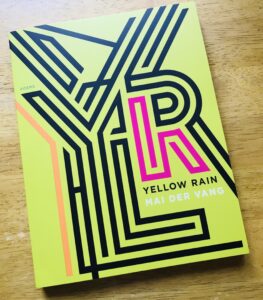
Published by Graywolf Press
Forthcoming September 21, 2021
OVERVIEW
We don’t have the means to give up the absolute.
Too much drains at stake to ratify our own absurdity.
Announce our verdict of confusion we cannot
plan the uninvited but to blend
dichotomies of truth brain-drowsed junked out
crude to concede.
We an impressive debacle.
Here lie
the ashes
of our
sanity.
—from “We Can’t Confirm Yellow Rain Happened, We Can’t Confirm It Didn’t”
In this staggering work of documentary, poetry, and collage, Mai Der Vang reopens a wrongdoing that deserves a new reckoning. As the United States abandoned them at the end of its war in Vietnam, many Hmong refugees recounted stories of a mysterious substance that fell from planes during their escape from Laos starting in the mid-1970s. This substance, known as “yellow rain,” caused severe illnesses and thousands of deaths. These reports prompted an investigation into allegations that a chemical biological weapon had been used against the Hmong in breach of international treaties. A Cold War scandal erupted, wrapped in partisan debate around chemical arms development versus control. And then, to the world’s astonishment, American scientists argued that yellow rain was the feces of honeybees defecating en masse—still held as the widely accepted explanation. The truth of what happened to the Hmong, to those who experienced and suffered yellow rain, has been ignored and discredited.
Integrating archival research and declassified documents, Yellow Rain calls out the erasure of a history, the silencing of a people who at the time lacked the capacity and resources to defend and represent themselves. In poems that sing and lament, that contend and question, Vang restores a vital narrative in danger of being lost, and brilliantly explores what it means to have access to the truth and how marginalized groups are often forbidden that access.
BLURBS
“Mai Der Vang’s Yellow Rain spoke to a piece of my heart that has yearned for such a work as this to come forth in response to the layered tragedies of our shared history, to establish a record in which our voices cannot be erased, our bodies forgotten, and our names forsaken. This book is an indictment of the highest and most poetic order against the experiments used by the United States of America to alter air, water, fire, and earth in its wartime practices before, during, and after America’s Secret War in Laos.”
—Kao Kalia Yang
“Mai Der Vang’s Yellow Rain is a masterful, thorough, and gripping examination of the USA’s legacy of horrific chemical warfare, displacement, and colonialism. This is a diasporic odyssey balanced between personal history, national tragedy, meticulous documentation, and a deft, precise, courageous pen. Vang’s interrogation of the CIA’s genocidal ecocide perpetuated on the Hmong in Laos and Vietnam has created a space within these pages where the killed ones speak with us, where the scattered living look back toward the sky and declare that ‘History will not beget / myth will not make us / into marginalia.’”
—Tyehimba Jess
“Writing defiantly against the erasure and dismissal of Hmong experience, Mai Der Vang offers an intense condensation of Hmong knowledge and truth in Yellow Rain. This is an impressive accomplishment that blends poetry, archive, history, and polemic in a bravura effort to assert the being and voice of Hmong people.”
—Viet Thanh Nguyen
“Mai Der Vang intensifies and innovates documentary poetics in Yellow Rain. It confronts empire’s crimes against humanity and the interlocking power of science and military-industrial complex. Yellow Rain is a magnificent textual revolt against historical amnesia.”
—Don Mee Choi
